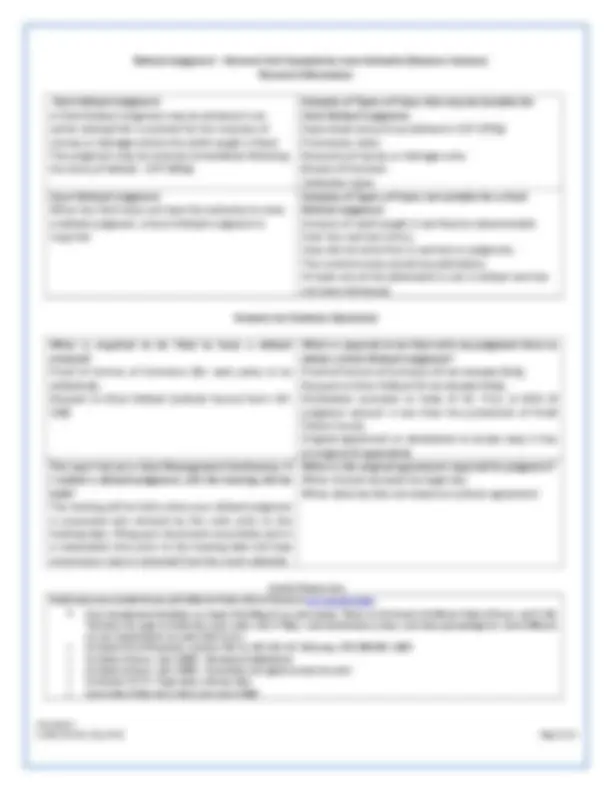



Study with the several resources on Docsity

Earn points by helping other students or get them with a premium plan


Prepare for your exams
Study with the several resources on Docsity

Earn points to download
Earn points by helping other students or get them with a premium plan
Community
Ask the community for help and clear up your study doubts
Discover the best universities in your country according to Docsity users
Free resources
Download our free guides on studying techniques, anxiety management strategies, and thesis advice from Docsity tutors
A checklist for obtaining a clerk default judgment in california civil cases. It covers the requirements for proof of service of summons, request for entry of default, and clerk default judgment. The document also includes information on the types of cases suitable for a clerk default judgment and common questions. It is intended to assist in properly filing default judgments with the court.
Typology: Study notes
1 / 3

This page cannot be seen from the preview
Don't miss anything!


Information
Use this checklist to complete your default judgment prior to filing it with the court. The Default Judgment Checklist is intended to provide a guideline to properly file your Proof of Service, Request for Entry of Default and Clerk Default Judgment. A clerk may enter a default judgment in a written obligation (e.g., contract or promissory note) action only if the amount due is set forth in the contract or may be determined from the terms of the agreement. The action must state the amount due in the written agreement or must be easily determined without taking evidence. Examples of case types that are typical of a Clerk Default Judgment include: open book accounts (credit cards), bad checks, accounts stated based on statements, and promissory notes for money owed, and collection cases. A clerk default judgment may be obtained when the defendant fails to file a response to the summons and complaint within the time specified on the summons. Even if the defendant fails to file a response, you will not obtain a default judgment if the named defendant has not been properly served, the party names do not match the names on the complaint or on any subsequent amendments to the complaint, or there are other technical defects such as omitting a signature. This information is intended as a guide to assist you in processing your default judgment.
Information
3. Clerk Default Judgment. Use Judicial Council form JUD‐100. *Note: If a statement of damages was required, you must proceed with a Court Default Judgment. Any damages, prejudgment interest, attorney fees, costs or other monetary amounts, if requested, must be stated 1) in the prayer of the complaint, and 2) must be specified on the Request for Entry of Default form (page 1, section 2). The clerk will not calculate the amounts for you. Use Judicial Council form CIV‐ 110 – Request for Dismissal, to dismiss any named or doe defendants not stated on the judgment. Costs claimed on the judgment: If the case could have been filed in Small Claims Court , you may apply to the court to have costs allowed as part of the judgment. If the case could not have been filed in Small Claims Court (e.g., assigned claim), submit a declaration stating that the demand letter was mailed to the defendant, notifying them that they are liable for court costs (Code of Civil Procedure section 1033). You must apply to the court to have costs allowed as part of the judgment. Interest claimed on the judgment: Interest is allowed at the legal rate unless the contract allows for a higher rate. This must also be specified in the prayer of the complaint. If the amount exceeds the legal rate, the original contract must be filed with the court. Attorney Fees claimed on the judgment: Attorney fees claimed must comply with any schedule provided for by local court rules. If attorney fees are allowed by a specific statute, such as Civil Code section 1717, et seq., this must be specified in a separate declaration or specified in the prayer of the complaint. If attorney fees are based on a written agreement, this must be stated in the prayer of the complaint. The original contract must be filed with the court. Written Agreement: Submit the original contract or a copy of the contract with a declaration why the original contract cannot be submitted. This must be filed when requesting attorney fees in accordance to the agreement or when requesting interest that is more than the legal limit. You can help expedite your judgment by highlighting the agreement for attorney fees and any interest claimed that exceeds the legal amount. In most instances, the legal amount is 10%. Fee Waiver has been granted for prevailing party: The judgment must include all fees that were waived by the court. Any costs collected must be paid to the court.